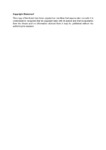Using diffractive activity to (re)configure parental choice of pre-compulsory education
| dc.contributor.supervisor | Georgeson, Jan | |
| dc.contributor.author | Bamsey, Victoria | |
| dc.contributor.other | Plymouth Institute of Education | en_US |
| dc.date.accessioned | 2021-10-29T11:30:42Z | |
| dc.date.issued | 2021 | |
| dc.identifier | 10381733 | en_US |
| dc.identifier.uri | http://hdl.handle.net/10026.1/18195 | |
| dc.description.abstract |
Prompted by the increasing number of children accessing alternatives to mainstream education, this research project was designed to investigate the activity of parents as they engaged in choosing different forms of education for their four-year-old child. The intention was to highlight the individual and entangled activity of parental choice in the English system of education. Facet methodology facilitated an exploration of the multi-dimensionality of each parent’s lived experience. It allowed for flexibility within the research process that used open interviews to follow the narratives of six sets of parents while they were thinking about and making different educational choices for their child. This included home education, the local primary school, a creative education, a Steiner school, a Montessori school and an independent selective school. Drawing upon Vygotsky’s socio-cultural theory of individual activity as a framework for thinking about educational choice, combined with the new materialist concepts of intra-action and diffraction, the conceptual framework of ‘diffractive activity’ has been developed. Diffractive activity brings to the fore the role of history, society and relationalities within the activity of choice. It is built upon five principles of complexity, intra-action, diffraction, entanglement and movement. Findings cast the activity of educational choice as a complex process of coming to know, influenced by possibilities, relationalities and entanglements. It starts as an internal process of thinking where educational choice is not limited by practical circumstances but is open to different possibilities. Relationalities emphasise how choice is not a linear process but a dynamic, iterative and entangled process. Entanglements bring choice alive, as a lived experience, an activity that is threaded through time, space, and place. My conclusions are two-fold, firstly that educational choice does not begin with a choice of school, but is a relational activity of thinking about education, and secondly through the introduction of diffractive activity as a framework for thinking about individual human activity. | en_US |
| dc.language.iso | en | |
| dc.publisher | University of Plymouth | |
| dc.subject | Early Years | en_US |
| dc.subject | Education | en_US |
| dc.subject | Choice | en_US |
| dc.subject | Activity Theory | en_US |
| dc.subject | Vygotsky | en_US |
| dc.subject | Diffractive Activity | en_US |
| dc.subject.classification | Other (e.g., MD, EdD, DBA, DClinPsy) | en_US |
| dc.title | Using diffractive activity to (re)configure parental choice of pre-compulsory education | en_US |
| dc.type | Thesis | |
| plymouth.version | publishable | en_US |
| dc.identifier.doi | http://dx.doi.org/10.24382/667 | |
| dc.identifier.doi | http://dx.doi.org/10.24382/667 | |
| dc.rights.embargodate | 2022-10-29T11:30:42Z | |
| dc.rights.embargoperiod | 12 months | en_US |
| dc.type.qualification | Doctorate | en_US |
| rioxxterms.version | NA | |
| plymouth.orcid.id | 0000-0002-3339-1496 | en_US |
Files in this item
This item appears in the following Collection(s)
-
01 Research Theses Main Collection
Research Theses Main


